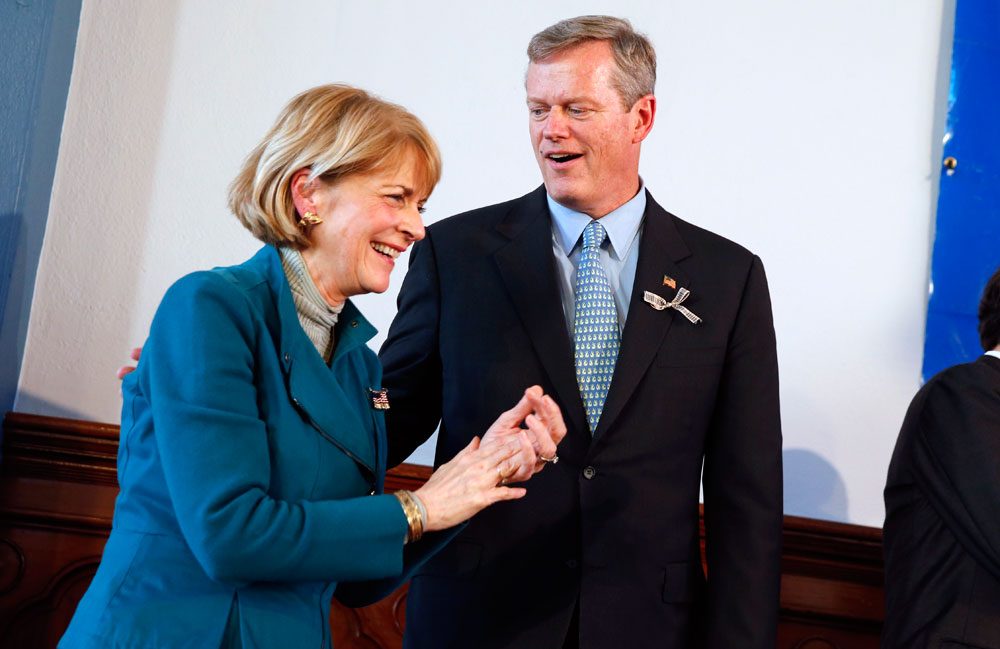Advertisement
5 Key Policy Differences Between Baker And Coakley

Many polls, including WBUR's most recent survey, show the race for governor is neck-and-neck between Democrat Martha Coakley and Republican Charlie Baker.
Some analysts have suggested that with Election Day inching closer, the two front-runners have shied away from drawing sharp distinctions, in an effort to win over unenrolled voters.
But if you listen closely, there are a few noteworthy contrasts between Baker and Coakley.
Here's a handy voter guide, in which we explore five issues where the candidates have set themselves apart. (Inevitably, there are other differences, but after sifting through countless speeches and policy positions, we whittled our list down to these five salient issues.)
(Three independents are also in the race: Evan Falchuk, Jeff McCormick and Scott Lively.)
Early Education And K-12 Schools
On education, the two candidates don't differ as much in substance as they do in priorities.
Early childhood education is central to Coakley's campaign. Her goal is "universal" access to pre-K, but she’s proposing an abbreviated version that focuses on impoverished communities.
In Massachusetts, low-income families are eligible for pre-K subsidies from the state. But many eligible families don't receive the benefits; currently there are about 16,600 kids on the state's waiting list (this number includes infants and toddlers). Coakley promises she’ll end the income-eligible waitlist by adding thousands of new pre-K spots.
Baker calls for a "targeted investment" in early childhood education that focuses on the most troubled communities, but he warns that Coakley's plan focuses too much on pre-K at the expense of ensuring a strong elementary school education. He points to research that shows early childhood gains can fade with time.
Instead of pre-K, Baker, who sits on the board of the Phoenix Charter Academy Network, is concentrating on raising the state cap on charter schools. Earlier this month, when the state Department of Elementary and Secondary Education rejected all new charter school applications, Baker quickly urged the department to reconsider its decision.
Coakley jumped on the bandwagon a bit later. She's less vocal in her enthusiasm for charter schools, but during the Democratic primary she said she would support a modest expansion in the number of charter schools, so long as the expansion is balanced with greater accountability to ensure traditional public schools are not hurt.
Higher Education
According to a recent WBUR tracking poll, making higher education more affordable is one of the top issues for likely Massachusetts voters.
But Baker and Coakley have vastly different ideas about how to tackle that problem.
Baker's plan focuses on systemwide reforms of the public system, such as online learning, three-year degrees and co-op programs, that could be implemented with little additional state spending. His proposal includes the idea of opening up possibilities for high-performing students to earn both bachelor's and master's degrees within four years.
Baker also wants to work with the state Board of Higher Education to design a new three-year bachelor's degree; that would, of course, reduce the cost of college by about 25 percent.
Coakley's ideas are perhaps more traditional, concentrating on ways families can pay for college tuition, rather than focusing on ways to rein in college costs.
She wants to create a full-need financial aid package at community colleges, which means the state would cover the costs for any qualifying student who can't afford tuition with the usual financial aid available.
The attorney general has also called for more incentives to help families start saving for college earlier. She wants to establish a $5,000 state tax deduction for families that contribute to a tax-free college savings account.
Her campaign estimates the two proposals collectively would cost $250 million annually.
Sick Time
Coakley supports Question 4 on the November ballot, which would guarantee sick time for all Massachusetts workers and specify the rules of engagement. It would allow employees to accrue up to five sick days per year. Employees of businesses with 11 or more workers would earn paid sick time, while employees of smaller companies would earn unpaid sick time.
Baker opposes the ballot question. He suggests it's excessively rigid and could hurt the Massachusetts job market. Instead, he's proposed an alternative idea that would only offer sick time to employees of businesses of 50 or more people. His plan incorporates some elements of the ballot measure supported by Coakley but he says it's also more flexible; companies that already offer 10 days of paid "flex time" would be exempt.
The Baker plan also calls for a slower rate of accrual. Employees would earn one hour of sick time per 40 hours worked, as opposed to one hour per 30 hours worked under the ballot measure supported by Coakley.
Welfare Reform
The recent WBUR poll also showed welfare reform among voters' top concerns. It was a higher priority than income inequality, earned sick time and transportation.
The issue is particularly popular among Baker supporters, and the Republican candidate has made welfare reform a cornerstone of his campaign platform.
He has a long list of ideas, including: incentives for employers to hire people on welfare; stricter conditions for welfare recipients to search for work before receiving benefits; and a rule that would raise the age at which people could become exempt from the work requirement, from 60 to 66.
Many of the reforms Baker is suggesting are already law, passed by the Legislature and signed by the governor this summer. Baker has said he's continuing to emphasize welfare reform because he's eager to implement the changes.
Coakley has criticized Baker's emphasis on the issue, and while welfare reform is not a major component of her campaign, she supports a plan that would ban stores implicated in any sort of benefit fraud from selling alcohol, tobacco and lottery tickets.
Climate Change
Baker has gotten a lot of heat for his 2010 position on climate change. According to The Boston Globe, at that time, Baker believed climate change was not the result of humans, a position that's been debunked by most scientists.
Baker disagrees with the Globe's interpretation of his 2010 opinions, but in this election, he's not taking any chances on being misunderstood. He told the Globe recently that humans are driving carbon emissions increases, and he's clear that he recognizes the dangers of climate change and supports the clean energy sector.
In fact, in endorsing Baker for governor, The New Bedford Standard-Times cited his support of renewable energy and, more specifically, the New Bedford Marine Commerce Terminal, which is designed to help transport offshore wind turbines to sea.
But it's Coakley who has called for the most extensive plans to curtail climate change and protect the environment.
Within the next eight years, she wants every home and business in the commonwealth to undergo an energy audit.
She also intends to double the amount of funding the Massachusetts Clean Energy Center receives annually, raising it from $25 million to $50 million per year. The MassCEC was created under Gov. Deval Patrick to accelerate the growth of green technology.
But on a couple of underlying principles, the two candidates agree: They’ll devote at least 1 percent of the state’s budget to environmental issues; they'll support the goal of reducing greenhouse gas emissions 25 percent by 2020 and 80 percent by 2050; and they'll support tax credits to promote renewable energy. Although in regard to tax credits, Baker makes clear he supports them as a principle; he does not believe the state should be picking winners and losers within the green energy sector.
